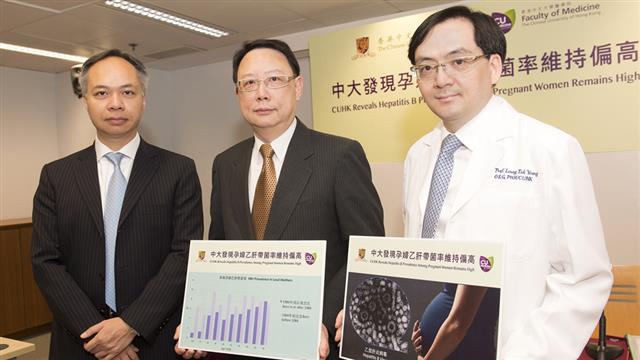Mother-to-infant transmission is a major cause of hepatitis B virus (HBV) infection. And the most effective prevention is neonatal immunization given shortly after birth. Hong Kong implemented a HBV vaccination programme 1983 to inoculate the newborns whose mothers were HBV carriers. Since November 1988, neonatal HBV vaccination has become universal for all newborns. However, research at CUHK reveals that the prevalence of HBV carriers remained high among pregnant women.
The standard method of screening for infection with HBV is a blood test that looks for the hepatitis B surface antigen (HBsAg), a protein found on the surface of the viral particle. Prof. Lao Tzu-hsi Terence at the Department of Obstetrics and Gynaecology said, 'In Hong Kong, pregnant women presenting for antenatal care are routinely screened for HBsAg status. By comparing the current prevalence with figures published from Hong Kong in previous years, we can see that there is no decline in the prevalence of hepatitis B infection after the implementation of vaccination.'
The CUHK Department of Obstetrics and Gynaecology has examined the prevalence among 10,808 local mothers aged from 16 years to 25 years who delivered in the Prince of Wales Hospital from 1998 to 2011, and found it to be progressively increased and correlated with age.
Prof. Chan Kay-sheung Paul, chairman, Department of Microbiology, said, 'Immune memory has declined in a substantial proportion of individuals despite a full course of vaccination in infancy.' Since vaccination does not provide lifelong protection, Professor Lao suggested that women planning for pregnancy should be tested for HBsAg and antibody. If they get a negative test result, they may consider sparing six months to complete the three-dose booster before having a baby.
For details, please click here.


